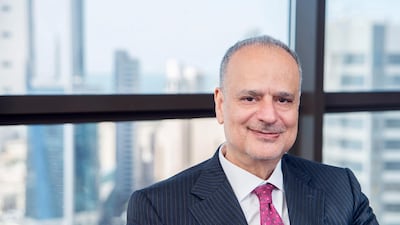Al Ahli Bank of Kuwait plans to roll out new advisory services for clients and increase its share of financing deals within the Arabian Gulf region, especially in the UAE, as the lender builds capacity at its newly established corporate finance hub in Dubai, its group chief executive said.
"The government [entities] are attractive because of low risk, but any financing deal where return on capital is attractive we will consider," Michel Accad told The National in an interview. "We are sector agnostic and as far as the deal opportunity goes, we are open to any sector."
Regional and international lenders are boosting their presence in the UAE, as the second largest Arab economy gathers pace after two years of slower growth due to a three-year slump in oil prices. As Brent climbs near $80 per barrel, the UAE increases spending on infrastructure and Dubai Expo 2020 related projects, banks are gearing up for financing opportunities.
Kuwait-listed ABK, along with First Abu Dhabi Bank and Noor, led the $480 million (Dh1.8 billion) revolving credit facility this week for Dubai Aerospace Enterprise, the Middle East’s biggest aircraft lessor, which is expanding its fleet of aircraft. The four-year deal, which can be extended up to $800m, has both Islamic and conventional tranches. It adds to financing options for DAE as the state-owned enterprise continues to talk with Airbus and Boeing for a possible order of 400 jets.
The deal, the largest that ABK lead-managed so far, is a major win for its new DIFC hub, booking the accord just days after launching operations this month. The lender now seeks more corporate finance deals and opportunities including Expo 2020-related financing projects, Mr Accad said.
ABK, which has a commercial banking branch in Dubai and Abu Dhabi is leveraging its DIFC presence to become a regional corporate finance player, engaging in debt capital market transactions and loan syndication.
“What we are trying to do is to create a regional corporate finance hub for ABK as a group. The proper place for that hub is DIFC, not the head office [in Kuwait]," Mr Accad said. “We want to be closer to the regional clients and close to the banks we will work with.”
ABK currently has a core team of about half a dozen personnel in DIFC. It plans to hire more corporate finance and merger and acquisition specialists as it rolls out structured and corporate finance advisory services. The DIFC team will get support from onshore branches for treasuries and back-office operations, he said.
“Within the next two to three years we should be able to double the number of people in the DIFC, if we are successful,” he said.
The bank, which expanded its geographic footprint to Egypt in 2015, is currently putting together its digital banking strategy which it expects to finalise within the next three-to-four months. ABK will then allocate funds for investment in digitisation including improving its digital product offerings in the UAE to better compete with the likes of Mashreq and Emirates NBD that are aggressively spending on their own digitisation plans.
_________
Read more
Dubai Aerospace secures up to $800m in funding as it mulls 400-jet order
Dubai Aerospace in talks to place multi-billion dollar order for 400 jets
Emirates NBD launches digital-only bank for millennials
_________
“If you think of the UAE for instance, with two branches you can only offer a corporate banking proposition and you can’t really compete in the retail space, unless the offering is from the digital platform,” Mr Accad argued.
Unlike other regional lenders, ABK doesn’t see its digitisation drive leading to branch closures or a reduction in headcount.
“We are not looking at downsizing the staff at branch level but like every bank we need to look very closely at our digital banking options,” he said.
ABK’s overseas operations currently account for 20 per cent of the total banking business and the lender would like to push that to about one third over time, Mr Accad said. Assuming the bank doesn’t make any acquisitions, this target could be achieved in four-to-five years or earlier if ABK buys new assets or foreign portfolios, he noted.
ABK doesn’t have plans to expand its footprint beyond the three geographies it currently operates in and will prefer to consolidate its presence.
“If there is, for example, an opportunity of purchasing a bank in the UAE, maybe we will do that. That may make more sense for us than thinking about expanding into a new country.”


